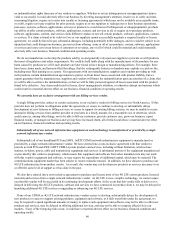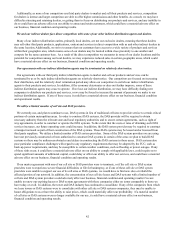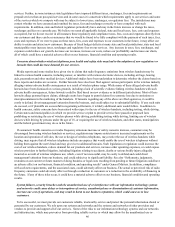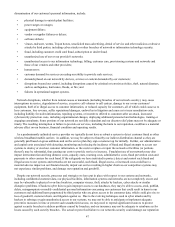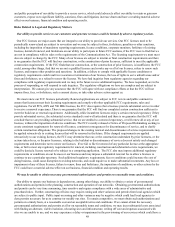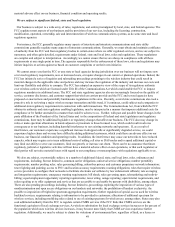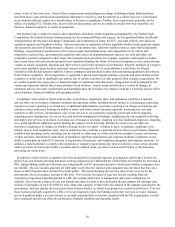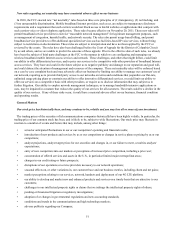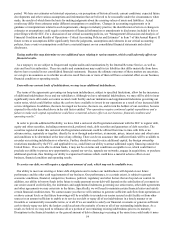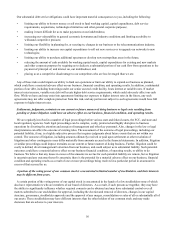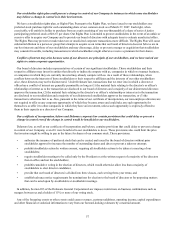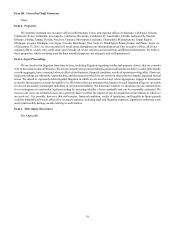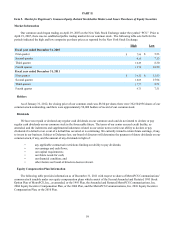Metro PCS 2011 Annual Report Download - page 60
Download and view the complete annual report
Please find page 60 of the 2011 Metro PCS annual report below. You can navigate through the pages in the report by either clicking on the pages listed below, or by using the keyword search tool below to find specific information within the annual report.49
material adverse effect on our business, financial condition and operating results.
We are subject to significant federal, state and local regulation.
Our business is subject to a wide array of rules, regulations, and orders promulgated by local, state, and federal agencies. The
FCC regulates most aspects of our business and the provision of our services, including the licensing, construction,
modification, operation, ownership, sale and interconnection of wireless communications systems, as do some state and local
regulatory agencies.
For instance, the FCC generally regulates many aspects of interstate and intrastate communications and state utility
commissions generally regulate many aspects of intrastate communications. Generally, we must obtain and maintain certificates
of authority from the FCC and from regulatory bodies in certain states where we offer regulated services, and we are subject to
numerous, and often quite detailed, requirements under federal, state and local laws, rules and regulations. These regulations
are complex and subject to interpretation. Accordingly, we cannot ensure that we are always in compliance with all these
requirements at any single point in time. The agencies responsible for the enforcement of these laws, rules and regulations may
initiate inquiries or actions against us based on customer complaints or on their own initiative.
We cannot assure you that the FCC or any state or local agencies having jurisdiction over our business will not impose new
or revised regulatory requirements, new or increased costs, or require changes in our current or planned operations. Indeed, the
FCC has initiated a series of inquiries and rulemaking proceedings pertaining to the wireless industry that could result in
material changes in the applicable rules and policies and may increase the regulation of the industry and increase our costs and
limit our flexibility and ability to compete. The FCC has adopted an expansive view of the scope of its regulatory authority
over wireless carriers which are licensed under Title III of the Communications Act which could enable the FCC to impose
regulatory mandates in additional areas. The FCC and state regulatory agencies also are increasingly focused on the quality of
service, customer disclosures, and customer support that wireless carriers provide and the FCC and several agencies have
proposed or enacted new and potentially burdensome regulations in this area. Recently, several state commissions also took a
proactive role in reviewing a major wireless merger transaction and this trend, if it continues, could subject such companies to
additional state regulatory requirements in connection with such transactions. The Communications Act, from which the FCC
obtains its authority and state regulatory enabling legislation, may be interpreted in a manner that imposes additional costs for
compliance or be further amended in a manner that could be adverse to us. Further, with past and possible future changes in the
party affiliation of the President of the United States and in the composition of Federal and state legislatures and regulatory
commissions, there may be additional legislative or regulatory changes that affect our business. The FCC also may change its
rules or make spectrum allocations in bands adjacent or proximate to those licensed to us, which could result in adverse
consequences to our business, including harmful interference to our existing networks and spectrum. If, as a result of
interference, our customers experience a significant increase in dropped calls or significantly degraded service, we could
experience higher churn and we may have difficulty adding additional customers, which could have an adverse effect on our
business, our financial condition and operating results. In addition, the interference may cause our networks to have reduced
capacity, which may require us to incur additional costs of adding cell sites or DAS nodes and to spend additional capital or
may limit our ability to serve our customers, limit our growth, or increase our churn. There can be no assurance that future
regulatory, judicial or legislative activities will not have a material adverse effect on our operations, or that such regulators or
third parties will not raise material issues with regard to our compliance or noncompliance with regulations applicable to us.
We also are subject, or potentially subject, to a number of additional federal, state, and local laws, rules, ordinances and
requirements, including, but not limited to, common carrier obligations; universal service obligations; number portability
requirements; number pooling rules; rules governing billing, subscriber privacy and customer proprietary network information;
tower lighting and painting; access to E911 and location accuracy requirements; roaming obligations; rules that require wireless
service providers to configure their networks to facilitate electronic surveillance by law enforcement officials; rate averaging
and integration requirements; emergency warning requirements; bill shock; rules governing spam, telemarketing and truth-in-
billing; equal employment opportunity reporting requirements; tower siting, outage reporting; open Internet requirements, and
rules requiring us to offer equipment and services that are accessible to and usable by persons with disabilities, among others.
There are also pending proceedings including, but not limited to, proceedings exploring the imposition of various types of
nondiscrimination and open access obligations on our handsets and networks; the prohibition of handset exclusivity; the
possible re-imposition of bright-line spectrum aggregation requirements; further regulation of special access used for wireless
backhaul services; requirements relating to information to be provided to customers; allocation of additional spectrum for
wireless services, including modifying rules related to use of existing spectrum for wireless use; among others. States may also
seek additional authority from the FCC to regulate certain CMRS services if the FCC finds that CMRS services are the
functional equivalent of local exchange services. As wireless substitution for local exchange services increases or the percent of
the population which uses wireless devices increases, it may become more likely that CMRS services experience further
regulation. Additionally, we may be subject to claims for violations of environmental law, regardless of fault, as a lessee or



